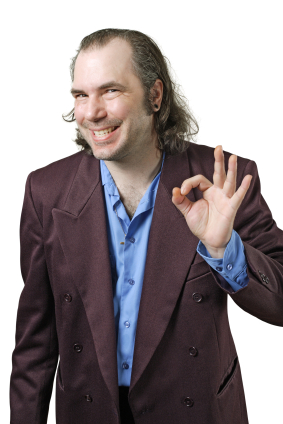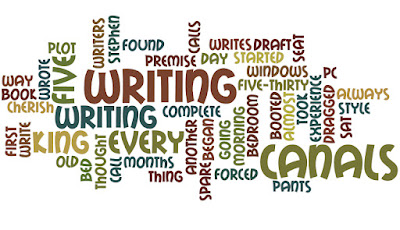I’ve always thought my novels were plot driven, but now I realize that’s not entirely true. A good story is critical, but a novel without good characters isn’t likely to be finished.
Where do fictional characters come from?
- From the author’s imagination: They’re made up.
- From the author’s experiences: They’re written after someone the author knew personally or knew of.
- A combination of the preceding two statements. Most characters probably fall into this category.
One of the scenes in my horror novel CANALS involves two Hispanics named Tony and Bobby, each a year out of high school. They met in fourth grade when Bobby, who was the biggest kid in school, bigger than any sixth grader (BIG!), saved Tony from an ass kicking. Bobby sat on the other kid until the bell rang, then shoved his face in the grass as he got up. The two were inseparable after that.
Until the monster ate one of them. You’ll have to read the book to learn who gets to live, though he was never quite the same after watching his buddy get munched.
Here’s a rather long, and explicit, excerpt from the book:
Tony spun an empty bottle toward the canal, watched it arch through the moon-lit night, heard the splash, and said, “Two-for-two, holmes. At this rate I’m going to take Kobe’s place on the Lakers, aye, ése?”
“Don’t call me ése, you wetback,” Bobby said. “You don’t even know how to speak Spanish, fool, and you damn sure can’t shoot like Kobe.” They were Lakers fans: Kobe Bryant was the man.
“Get your fat arm off the cooler, bitch,” Tony said, trying to get in the ice chest.
“Bitch hell. You ain’t got no bitch, bitch, unless you count that Wanda bitch at work.” Bobby laughed as he moved his arm and pulled a joint out of a plastic baggie. “Shit, you couldn’t even get in Wanda’s panties.”
“Shut up, ése. Wanda’s got back, man. I’m gonna get me some of that, you wait and see.”
Bobby laughed again. “You stupid wetback, I’ll have a gray beard down to my ass before you get with Wanda. Besides, she’s ugly. And don’t call me ése, bitch.”
“Man, but could you do Yolanda?” Tony said, grabbing his crotch. “That bitch is fine!” He took a long pull from his bottle.
“Shit yeah, I could do Yolanda four times a day, bitch.” Bobby reached across the cooler and said, “Gimme five for Yolanda’s fine pussy.” Although neither boy had seen or touched Yolanda’s genitals, nor would they ever get close, they fived it across the beer cooler.
Bobby lit the joint and took a deep hit, holding in the potent smoke as long as his burning lungs allowed. He exhaled slowly, tilting his head up, blowing smoke at the stars.
“Gimme the smoke, ése,” Tony said, reaching across the cooler, tapping Bobby’s arm.
“I just got it started, fool. All I got was paper. Let me get some weed first, bitch. And don’t call me ése.”
“Bitch this, bitch,” Tony said, grabbing his crotch again and watching his friend hit on the joint. He tapped Bobby on the arm again. “Pass the joint, bitch!”
Bobby leaned away from his friend and sucked longer on the thin marijuana cigarette, just to piss Tony off. He fought off a cough; small wisps leaked from his nostrils as he finally passed the joint to Tony.
“See, bitch,” Tony said, as he took the joint and scowled. “You took too much, ése. Man, I don’t know why I share my weed with you. You’re a fat weed hog, bitch.”
Bobby coughed out his hit and took a pull from his Corona to douse the fire in his throat. Still coughing, he said, “Bitch, your weed? I bought this weed, bitch. And don’t call me ése, bitch.”
Tony considered that for a moment, then said, passing the joint back, “Oh yeah. That’s right, you did buy it. Bitch.”
They looked at each other and started laughing; a stoners’ laugh, hard and uncontrollable, so hard they fell out of their chairs into the sand where they rolled onto their backs and laughed at the moon and the stars until side cramps forced them to stop. Wiping tears from their bloodshot eyes, they righted their chairs and resumed their positions of importance on opposite sides of the cooler.
You might now ask yourself, where did I get those characters? Did I just make them up? Turns out, I didn’t. I worked with a real-life Bobby and Tony, and their repartee was very much like it was in the book. I worked with them on the loading dock of the Foster Farms poultry plant in Livingston, California. I know you’re dying to know the story, so...
If you live on the West Coast, or shop at Costco, you should be familiar with Foster Farms poultry products. Max and Verda Foster started Foster Farms in 1939, on an eighty-acre ranch near Modesto, California. Many years later, they bought poultry plants in Oregon and Washington, which is why you can find their chicken in every grocery store on the West Coast. I think their chicken is the best “grocery-store” chicken. I’ve eaten free-range and organic chicken only once or twice; they might be a better product, I don’t know. Foster Farms also raises turkeys—the fictional Bobby and Tony worked at the Foster Farms turkey processing plant in Turlock, California—and run a dairy. All-in-all, I’d buy their products over their competitors nine times out of ten.
I started working for Foster Farms the fall after high school. I had two roommates who worked for them on the night shift and their foreman was looking to put together a basketball team, and I was a decent basketball player, so I easily got the job. I didn’t even have to apply. The first time I walked into the part of the plant where I’d be working, I was blown away.
Foster Farms is not even close to being as big as, say, Tyson Foods, the largest meat processor in the world, but they’re the biggest on the West Coast. According to an article I found on the Internet (which of course has to be true), Foster Farms processes almost 600,000 chickens a day. That’s not a typo.
I walked into a room the size of a large warehouse, about four stories high. Huge. When the processing lines started up, there were about eight, I looked up and saw chickens coming down out of the sky by the hundreds. They’d already been plucked, eviscerated, and cleaned; they looked like the whole chickens you bring home from the grocery store.
The first line was called the “bag line,” and it ran fast because all they had to do was stuff a packet of innards into the cavity of the chicken and slip a bag up and around it. No, the neck and innards you pull out of the chicken you’re about to cook didn’t come from that chicken.
The line I was put on was a cut-up line (though we were too busy to be cut-ups while working): chickens were dismembered a piece at a time so that by the end of the line nothing but drumsticks were left. The first person on the line cut the left wing off every bird, the next got the right wing. Then came the breast guys. I was a breast guy. Each breast guy cut the breasts off every other chicken. Lastly, two people cut the thighs off. The drumsticks fell off on their own. The chicken parts were thrown or dropped onto big pieces of sheet metal in front and below us. The parts slid to the bottom of the sheet metal, where they could be grabbed and packed.
The cutters stood on a steel platform, about four feet high. In front and below us were the packers, who grabbed the cut-up parts and placed them on Styrofoam trays that passed by on a fast-moving conveyor belt. The drumstick guy, or gal—lots of women worked at Foster Farms—placed six drumsticks on a tray, turning them so the round side faced upward (if they had time). The next person did the same with the thighs. The breast halves were packed three to a tray and I can’t recall how many wings a tray got. Six sounds right.
And that’s how the line went, hour after hour, for eight hours minus breaks and lunch. Being a breast guy was grueling work, especially when your knives got dull, which mine always did. I never got the hang of the second cut, where you had to run the blade down the chicken’s intercostal cartilage. I’d miss most of the time so the blade would have to be pushed through bone. After a while, the blade would become dull and I’d have to push harder to cut the breast off. And the hand that held the chicken had to be covered with a mesh glove too small for my big hand so that it was killing me by lunch. You get the picture.
One funny anecdote. Funny to me, at least. I’d be hacking away at the chicken when suddenly, but thankfully rarely, a big blob of chicken fat would flick off the end of my knife, fly down and hit the woman below me in the face. A hazard of their job, I suppose. I worked at each station of the cutting line at least once but never did the packing. I’m six-four and the line was made for people five-five, or less.
Job openings were posted on a corkboard in the break room. I was tipped off about an opening in the cooler, so I applied and got the job. Anything to get off the cutting line. Cases of packaged chicken sat in the cooler until they were loaded onto delivery trucks.
The weight room sat a floor above the cooler. Styrofoam packs of chicken, or bags of whole chicken, were weighed and priced, then packed into cases. The cases slid down a track of rollers to the cooler. The whole production was coordinated, meaning the weight room processed orders that went together so we could stack the order’s cases on the same pallet, or pallets if the order was large.
It was hard backbreaking work, when you were working. The cases of whole chickens could weigh up to sixty pounds (maybe fifty—it’s been a long time). But if the weight room had a problem, no cases dropped into the cooler and we got to kick back. We’d bundle up in our company-issued jackets, nest down on a few cases of chicken, and take a snooze.
As I recall, I was recruited for my next position: lead man on the loading dock. I was promoted ahead of guys who’d worked there many years longer than I had. Looking back, it might’ve been because I had actually graduated from high school (remember, this was the night shift) or was clearly more intelligent than my co-workers (which isn’t saying much, believe me).
The loading dock’s front office would give me sheets of orders at the beginning of the night, one sheet for each truck backed into the loading dock. I’d write cases of products onto a piece of paper and hand it to one of the hand-operated forklift guys, who’d then trundle off to the cooler in search of the products. They’d come back with a load of chicken, stop in front of my station so I could make sure they had the right products and tally up the weights. Once that was done, they’d stack the product in the truck. Several aspects to my job were important: the truck had to be loaded with the right product, I had to have the weights correct, and the truck had to be loaded in the reverse order it was to be delivered. Make sense?
Tony and Bobby were forklift guys who worked out of the older cooler, located to my right as I’d sit on my stool and stare at the back of a truck. To this day I don’t where the chickens that came out of the older cooler went. They didn’t go into any of my trucks (or I’ve forgotten they did). The chickens in the old cooler were packed into waxed cardboard boxes, were smaller than the chickens I cut up on the line, and were packed with ice. My best guess is, they either went to restaurants or were shipped far away—thus the need for the ice.
I’d see Tony and Bobby almost every day, zipping in and out of the loading dock and the cooler. As their products weren’t loaded on my loading dock, the only time I’d see them is when they wanted to gab. As in their likenesses in CANALS, they were U.S.-born Mexicans. Or Americans of Mexican heritage. Whatever term is more politically correct these days. CANALS’s Bobby-and-Tony banter was as I remembered the real Bobby and Tony, except they weren’t stoned. I take that back. They usually weren’t stoned. They were fun guys, always joking, rarely down or depressed.
Sadly, I learned years later that Bobby was killed in a car accident while driving to Los Banos on fog-shrouded roads: very dangerous in the winter. His car flipped, he was ejected, and ended up with his head submerged in a ditch. He drown.
Hmm... I may have just tipped you off as to which dies in CANALS. Oh well, you should read the book anyway. If you don’t mind being scared.












